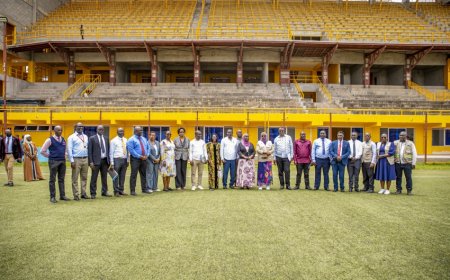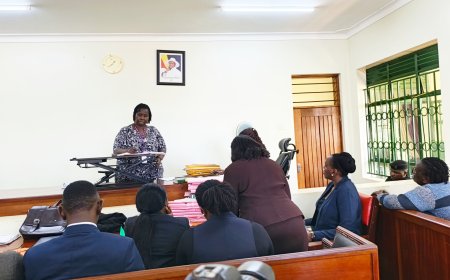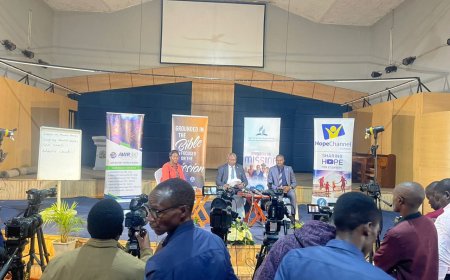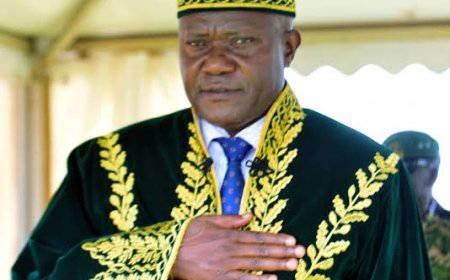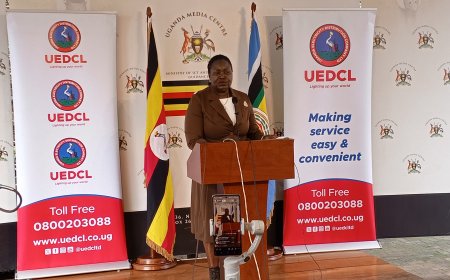URA Strengthens Collaboration with Customs Clearing Agents in Revenue Mobilization Efforts
As Uganda continues its revenue mobilization journey, collaboration between URA and key stakeholders in the trade sector remains paramount in achieving national economic growth and stability.
The Uganda Revenue Authority (URA), under the leadership of Commissioner General John R. Musinguzi, has engaged over 600 customs clearing agents in a high-level meeting aimed at re-aligning and strengthening their partnership in revenue mobilization. The engagement, held at Hotel Africana, Kampala, served as a platform for open dialogue, performance review, and the establishment of new compliance guidelines for 2025.
Speaking at the event, Asadu Kisitu Kigozi, the Acting Commissioner of the Customs Department,

emphasized the strategic role of clearing agents in trade facilitation and revenue collection. He acknowledged their contribution in bridging the gap between importers, exporters, and URA while also providing employment opportunities to many Ugandans.
Customs Clearing Agents: A Vital Partner in Revenue Collection
In his remarks, Asadu Kisitu Kigozi highlighted key aspects of the Customs Agents’ Performance for 2024, outlining their contribution to compliance and service delivery. He noted that customs clearing agents play a critical role in ensuring the smooth declaration and clearance of goods, a process that directly influences tax collection and trade efficiency.
“To everyone of you that has shown up today, I want to say thank you for building the nation because, without your pivotal role, URA wouldn’t be able to collect,” Kigozi remarked.
As mandated by Section 145(1) of the East African Community Customs Management Act (EACCMA), 2004, the Commissioner of Customs licenses agents to facilitate trade. However, clearing agents must also uphold tax compliance standards, including fulfilling domestic tax obligations such as VAT, income tax, and corporation tax.
Compliance Guidelines for 2025
As URA seeks to improve tax compliance and efficiency, the customs fraternity has been given clear compliance guidelines for 2025:
Employee Requirements:
A minimum of five employees per clearing company.
At least two employees handling customs clearance must hold a Certificate in Customs Clearing & Forwarding.
Compulsory attendance of at least three Continuous Professional Development (3CPD) sessions annually for all employees.
Directors, shareholders, and employees must not have interests in more than one clearing company/firm.
Domestic Tax (DT) Compliance:
Monthly monitoring of tax compliance in all tax heads (Corporation Tax, VAT, and Income Tax) for the company, directors, shareholders, and employees.
Directors who are not on the company payroll (PAYE) must obtain a Tax Clearance Certificate (TCC) for the period preceding the licensing period.
License renewal will require proof of remittance of at least UGX 50 million in domestic taxes.
Customs Compliance:
A clearing company must be solely licensed for clearance services and logistics management. It should not engage in general trade.
Agents must not use their TINs to clear goods for clients, as this would prevent importers from claiming input VAT.
To qualify for license renewal, a company must process Customs Declarations worth UGX 50 billion in Customs Value and contribute at least UGX 5 billion in taxes.
Misuse of login credentials will result in:
A 3-month license suspension for the company.
Expulsion of the staff involved in sharing usernames and passwords.
Mandatory acknowledgment/handover of Customs transaction documents (Form C36) between importers and clearing agents.

Introduction of a Customs agent performance dashboard for monitoring KPIs.
Creation of individual Customs agent badges with unique identification numbers.
Calls for Policy Reforms in the Customs Sector
The engagement also provided an opportunity for stakeholders to propose improvements in the Customs clearing sector. Jennifer Mwijukye,

Chairperson of the Authorized Economic Operator (AEO), called for a longer license validity period for Customs agents.
“URA should consider extending the Customs Agents' license from one year to three years, as practiced in neighboring Rwanda and Tanzania. This will ensure streamlined Customs processes across the East African Community (EAC),” she suggested.
Her sentiments were echoed by Charles Mwebembezi, President of the Federation of East African Freight Forwarders Associations (FEAFFA),

who emphasized the need for efficiency in Customs operations.
Professionalism and Integrity in the Clearing Fraternity
A key topic of discussion was integrity and professionalism in the clearing sector. Charles Ekweu, Director General of the Federation of Uganda Customs Agents and Freight Forwarders (FUCAFF), urged agents to uphold ethical standards in their operations.
“Integrity should be at the core of every clearing agent’s work. If we are aggrieved, we should not resort to social media to air grievances but instead follow the official objection process,” he stated.
The engagement between URA and Customs Clearing Agents marks a significant step towards enhanced compliance, trade facilitation, and efficient revenue collection. By setting new compliance guidelines, streamlining operations, and advocating for policy reforms, the URA is reinforcing its commitment to a transparent and accountable customs sector.
As Uganda continues its revenue mobilization journey, collaboration between URA and key stakeholders in the trade sector remains paramount in achieving national economic growth and stability.















































